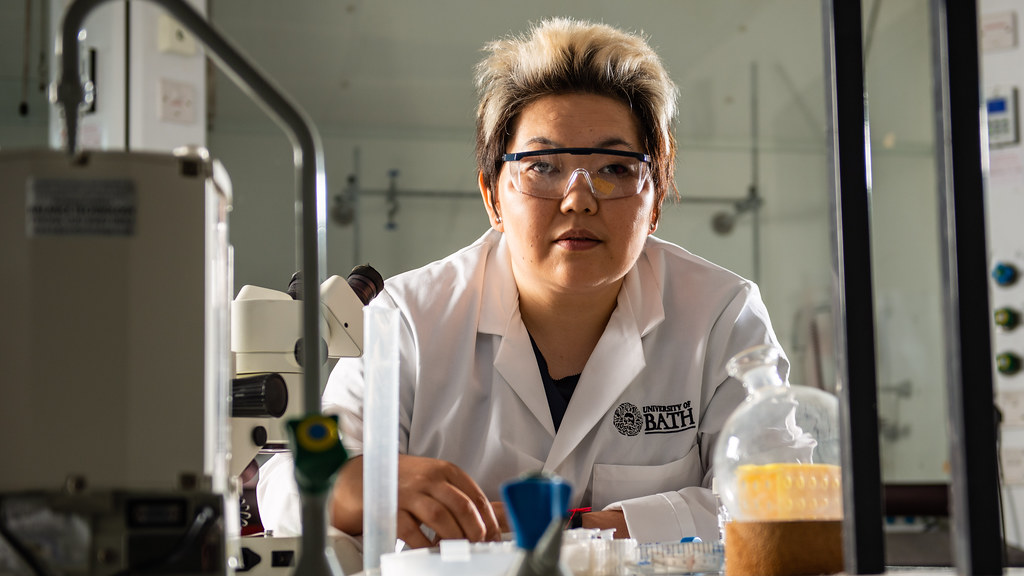A University of Bath spinout company dedicated to making vaccines safer has been awarded a highly competitive UK government contract.
The aim of the two-year contract, valued at around £1.7million, is to develop the world's first thermally stable mRNA vaccine. In its work at the university, the team behind Ensilicated Technologies Ltd (EnsiliTech) has developed ensilication – a technology that allows vaccines and other biological materials to be transported and stored without the use of refrigeration.
The funding for this project comes from the Department of Health and Social Care as part of the UK Vaccine Network – a UK Aid programme established to develop vaccines for diseases with epidemic potential in low- and middle-income countries. It will be managed by Innovate UK.
Dr Asel Sartbaeva, Chemistry researcher at Bath, co-founder and CEO at EnsiliTech, believes this technology has the potential to save tens of thousands of lives every year. The government contract will take her team one vital step closer to bringing it to market.
“We’re so proud to have won this important government grant,” said Dr Sartbaeva. “It comes after about 11 years of research on ensilication and means we can develop mRNA vaccines that are truly independent of the fridge and freezer.
“As transport and storage of COVID-19 mRNA vaccines have been shown to cost more than the cost of many actual vaccines, removing the fridge dependence will have a truly game-changing impact on our ability to distribute vaccines all around the globe, and can help save millions of people.”
The SBRI project, titled ‘Heat proofing immunity: pioneering a thermally resilient ensilicated mRNA-LNP vaccine platform’ is part of a wider call to develop vaccines and tools to fight the next pandemic.
By the end of the pre-clinical project, the vaccine technology is expected to be ready for clinical trials. A second five-year government contract is likely to follow, by the end of which ensilication should have completed, or nearly completed, clinical trials and overcome all regulatory hurdles. The government would then be able to licence the technology from EnsiliTech when the need arises.
“This is all part of a wider push to be ready for the next pandemic,” said Dr Sartbaeva. “The government wants to be in a position to act fast with vaccine rollouts next time.”
Partners
The project will be carried out by EnsiliTech alongside two partners: Afrigen, an mRNA manufacturing and development consortium based in South Africa, and EmerVax, a Texas-based company that formulates novel vaccines against neglected diseases. The research will be funded by the Department of Health and Social Care as part of the UK Vaccine Network (UKVN) – a UK aid programme developing vaccines for diseases with epidemic potential in low and middle-income countries.
The project will focus on the development of the world's first vaccine against Hantaan virus, which is extremely prevalent in Asia and South America.
Hantaan is spread mainly by rodents and can cause, among other things, Hantavirus Pulmonary Syndrome (HPS) – a severe, sometimes fatal, respiratory disease. There are over 200,000 global cases each year, with the number growing. A common side effect of infection is Haemorrhagic Fever with Renal Syndrome, resulting in a mortality rate of around 15%.
Currently, no vaccine is commercially available for this highly infectious and deadly disease, leaving many communities vulnerable.
The problem with ultracold vaccine storage
As well as helping save lives directly, the EnsiliTech project is expected to result in the development of a thermally resilient mRNA vaccine platform. This means the technology, once developed to administer a thermally stable Haantan virus mRNA vaccine, will be applicable to any number of mRNA vaccines.
mRNA vaccines have a huge potential to prevent not only infectious diseases but also certain cancers and a range of other previously unpreventable conditions. However, these vaccines currently require ultracold storage, needing to be kept at -70 or even -80 °C.
The system for storing and transporting ultracold vaccines around the world comes at a global annual running cost of $35bn. Not only is this cold-chain network expensive to operate but it is also prone to failure, leading to significant levels of spoilage and waste – around half of vaccines have to be discarded as a result of such failures, denying millions of people around the world access to potentially life-saving products.
According to the UN environment programme, around 50% of vaccines spoil and must be discarded as a result of such failures. Dr Sartbaeva said: “Our ensilicated mRNA platform has the potential to revolutionise vaccine distribution, particularly in remote or resource-limited areas where maintaining cold chain storage can be challenging.
“EnsiliTech’s pioneering work in this field will contribute to advancing global health and improving accessibility to life-saving vaccines.”
The Small Business Research Initiative (SBRI) supports research and development of solutions to public sector challenges. Any organisation of any size can apply for funding.

